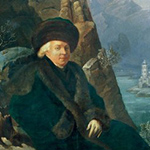THE BEE
Golden blur,
Why all abuzz?
Will you disappear?
Do you love
My Liza as
Much as I do?
Find you fragrant combs
in her honey-colored hair?
Find sun-shot rose
In her scarlet lip,
And in her breast
A nectar white and sweet?
Golden blur,
Why all abuzz?
In your sigh
I hear you say:
“Honey will be
The death of me.”
ПЧЕЛКА
Пчелка златая!
Что ты жужжишь?
Всё вкруг летая,
Прочь не летишь?
Или ты любишь
Лизу мою?
Соты ль душисты
В желтых власах,
Розы ль огнисты
В алых устах,
Сахар ли белый
Грудь у нее?
Пчелка златая!
Что ты жужжишь?
Слышу, вздыхая,
Мне говоришь:
К меду прилипнув,
С ним и умру.
LORDS AND RULERS
Rise God, most-high, and judge the host
Of earthly gods. How long
(Warns God) will you all spare the unjust
And not redress a wrong?
You whose duty is to keep the laws
And not withhold your help,
Not leave exposed orphans, widows,
Aid the strong nor hold them up.
Your duty is to shelter weak
And innocent, protect
And free from power’s abuse the luck-
Less poor enchained in debt.
With bribery-blinded eyes these gods
Don’t comprehend or heed;
They shiver earth with evil deeds
With seeming truth they bend
And blur all sight of heaven. Czars!
I deemed you powerful, divine,
No judgement ruling above yours,
But we are ruled by passion
Both you and I alike mortal;
Die we both the same
And like the leaves of trees both fall,
Your last slave and you the same.
Resurrect, God of the just, and heed
Their prayers; condemn
And scourge the guileful. Be Czar, O God,
Of earth yourself alone.
ВЛАСТИТЕЛЯМ И СУДИЯМ
Восстал Всевышний Бог, да судит
Земных богов во сонме их;
Доколе, рек, доколь вам будет
Щадить неправедных и злых?
Ваш долг есть: сохранять законы,
На лица сильных не взирать,
Без помощи, без обороны
Сирот и вдов не оставлять.
Ваш долг: спасать от бед невинных,
Несчастливым подать покров;
От сильных защищать бессильных,
Исторгнуть бедных из оков.
Не внемлют! видят — и не знают!
Покрыты мздою очеса:
Злодействы землю потрясают,
Неправда зыблет небеса.
Цари! Я мнил, вы боги властны,
Никто над вами не судья,
Но вы, как я подобно, страстны,
И так же смертны, как и я.
И вы подобно так падете,
Как с древ увядший лист падет!
И вы подобно так умрете,
Как ваш последний раб умрет!
Воскресни, Боже! Боже правых!
И их молению внемли:
Приди, суди, карай лукавых,
И будь един царем земли!
THE SWAN
With swan-like leap into the air I will
Distinguish from the dying world,
With wondrous, soaring flight
And immortal song and soul;
Undying two-fold form, without
A pause at purgatory’s doors,
Exulted above envy,
Worldly kingdoms and their light
I’ll leave below. Of lusterless birth,
Yet I, beloved of Muses, – yes! –
Unlike the other lords
Will be preferred by death.
The tomb will not clutch; nor will I lessen,
Not narrow into dust among the stars
But like the pipes of Pan
Be resounded into heaven.
I feel it now, the goose-bump skin
Pricks my feathering body tight,
The down on breast, on back
The shimmering wings of the swan.
I fly and soar, beneath me spread
The world, its seas and forests, which raise
Their heads aloft like peaks
To hear my song to God.
From Kuril Islands to the river Bug,
From White to Caspian Sea, all those
Who walk the half of earth,
The peoples of Russia, each age
In time will know me, all who fire
Quarrelsome words today, the Huns
And Finns, the Scythians, Slavs
Will say and point a finger –
Look, he flies, who tuned his lyre
And spoke the words that speak in hearts,
Urged peace on all, rejoiced
In joys of every other.
Away with pomp and glorious burial,
My friends! Muses, hush. My wife,
Put patience on, and him
Thought dead do not bewail.
ЛЕБЕДЬ
Необычайным я пареньем
От тленна мира отделюсь,
С душой бессмертною и пеньем,
Как лебедь, в воздух поднимусь.
В двояком образе нетленный,
Не задержусь в вратах мытарств;
Над завистью превознесенный,
Оставлю под собой блеск царств.
Да, так! Хоть родом я не славен,
Но, будучи любимец муз,
Другим вельможам я не равен
И самой смертью предпочтусь.
Не заключит меня гробница,
Средь звезд не превращусь я в прах;
Но, будто некая цевница,
С небес раздамся в голосах.
И се уж кожа, зрю, перната
Вкруг стан обтягивает мой;
Пух на груди, спина крылата,
Лебяжьей лоснюсь белизной.
Лечу, парю — и под собою
Моря, леса, мир вижу весь;
Как холм, он высится главою,
Чтобы услышать богу песнь.
С Курильских островов до Буга,
От Белых до Каспийских, вод
Народы, света с полукруга,
Составившие россов род,
Со временем о мне узнают:
Славяне, гунны, скифы, чудь, —
И все, что бранью днесь пылают,
Покажут перстом — и рекут:
«Вот тот летит, что, строя лиру,
Языком сердца говорил
И, проповедуя мир миру,
Себя всех счастьем веселил». —
Прочь с пышным, славным погребеньем,
Друзья мои! Хор муз, не пой!
Супруга! облекись терпеньем!
Над мнимым мертвецом не вой.
Translator’s Note:
Gavrila Derzhavin (1743-1816) wanted to be remembered more for his role as a statesman than for his poetry, which, in accordance with the values of his age, he compared to “delicious lemonade.” Nevertheless, it is his poetry that has made him “immortal.” Born into a family of the minor gentry in Kazan’ and tracing his ancestry back to the Tartar nobility of that city, he went on to serve in the imperial army during the Pugachev rebellion and to become a confidant of Catherine the Great; his interest today, however, is to be found in his sense of integrity and independence in his relationship to those in power. In this respect, while “speaking the truth to Czars with a smile,” in his work he urged humanity above all and dedicated his odes to heroes precisely as they fell from royal favor, courting the same fate himself out of a deeper sense of justice. He was among the first to introduce subjective, aesthetic experiences into the Russian lyric, at a time when poetry was largely devoted to praising the majesty of the Czar. Ranging from satirical realism to sublime disorder, his poetry contains a profound call on individual virtue in inconstant times as well as a sense of how the maw of eternity swallows all human things. It was Derzhavin who personally passed the baton to Pushkin, who in turn considered Derzhavin a poet of universal significance. Now he is remembered wherever the Russian tongue is spoken, and he has been an important touchstone for such modern poets as Khodasevich, Mandelstam, and Brodsky.
The poems translated here represent anacreontic lyrics and adaptations of the psalms and Horatian odes. The translations are not made to reproduce all formal and semantic features of the originals, although in an important sense they do remain faithful. Instead, they derive inspiration from the English baroque and 18th century tradition (Milton; Gray, Collins, Young) to create a language that translates Derzhavin’s sensibility, standing at the threshold between Classicism and Romanticism, into English.

John Hamel grew up in New Jersey but now lives in Minnesota. He has been a school teacher all his life. He has published several poems and translations of poems in the past (Arion, Notre Dame Review, Atlanta Review, Forum Italicum, American Journal of Poetry). You can find him on Instagram here: https://www.instagram.com/johnerichamel/

Peter Orte grew up in Minnesota and, having come by circuitous routes, currently lives in Maine. He teaches Russian language and literature.

Gavrila Derzhavin (1743-1816), arguably the most significant Russian poet before Pushkin, was born in the city of Kazan’ into a family of the minor nobility tracing its ancestry to the Tartar nobility of the city. Having won the favor of Catherine the Great through his honorable service in the Pugachev rebellion and for his poetry, he went on to become her confidant and gadfly, falling in and out of favor before retiring to his estate. Well acquainted with the precariousness of life, the turns of fortune, and capriciousness of authority, his poems contain some of the first subjective sensuous descriptions in the Russian lyric, a powerful summons to humanity, and a universal reminder of the mortality of human things.

 BACK TO ISSUE
BACK TO ISSUE